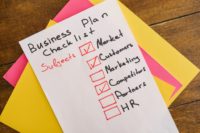We get it. Starting a business can feel overwhelming. Starting a brick-and-mortar business can feel even frightening. There are so many pieces to put in place, and if you drop the ball on even one of them, your entire business could be in jeopardy. That’s why we took the time to create this short checklist Read more
human resources

We get it. Starting a business can feel overwhelming. Starting a brick-and-mortar business can feel even frightening. There are so many pieces to put in place, and if you drop the ball on even one of them, your entire business could be in jeopardy. That’s why we took the time to create this short checklist for starting a new business. It will help you avoid many of the common mistakes people make when they get started and understand what you need to do every day to ensure your start-up stays afloat.

1. Register Your Business with the IRS
Once you know what type of business you’re creating and what product or service you will offer, you need to register your business name. Whether you do that as an LLC or a corporation, you must take this first step as early as possible. An LLC is the easiest and the most cost-effective way to register your small business through your state.
After securing your LLC, you’ll need to register with the IRS. It will generate your EIN or your federal tax ID number. For retail stores, you also need to obtain a sales license. Having an EIN will allow you to open a business bank account. Experts suggest going through a credit union, as they don’t require you to have large minimum balances on your account like other banks.
2. Hire a Bookkeeper
As a new business owner, you must track all your business expenses and money flow. It is essential for your taxes because you don’t want to lose money when tax season arrives. You can use software like QuickBooks for tracking. However, you should still try to find a qualified bookkeeper to keep your books in order. You will be busy running your business and bringing in customers, so you won’t have time to dedicate this task individually; after all, the last thing you want is the IRS investigating you.
3. Seek Out a Good Location
You can lease or buy commercial space. Leasing gives you the flexibility to move if you outgrow the area or need to expand. Plus, it gives you the benefit of a management company that will handle the tricky stuff like scheduling repairs. If you decide to purchase the space for your business, you must ensure that you have the right equipment and hire reputable contractors to maintain your store or a restaurant.
For example, a plumbing failure can become an immediate disaster at a restaurant, cafe, hotel, or healthcare facility. Experienced business owners know all too well how important it is to have a professional plumber on call. So, finding a commercial plumbing distributor will help you clear the way for smooth business operations.
4. Build a Website
Your physical location is one of the brand activation points. However, these days, the customer journey most of the time starts online. To ensure prospects can find your business, you must optimize your website for the local search. Even if it’s just a landing page at first, it helps you look professional and build trust with your clients before they visit your physical location. You can use simple website builders like Wix or Squarespace when starting to save some costs on hiring a web designer.
5. Hire Staff
Of course, you’ll need to hire staff before you open your doors. In some cases, you may be able to work independently. Before hiring, study the employment-related laws in your state, including the maximum working hours per week, the minimum wage, and what benefits you need to provide your employees. Once you’ve made your hires, ensure that you report these employees to your state within 20 days.
Get Ready to Open Your Doors
Now you’re ready to open your doors! Your supplies are prepared, your staff knows what to do, and your potential customers started exploring your website. It took some work to get to this point, but you are finally running your new business!

Industry veteran Terry Samona has been named Vice President of Human Resources at Viega LLC. Terry oversees human resources management and development at Viega’s operations in the U.S., including headquarters and a seminar center in Broomfield, Colo.; a manufacturing plant and distribution hub in McPherson, Kan.; three additional distribution centers in Nevada, Georgia and Pennsylvania Read more
 Industry veteran Terry Samona has been named Vice President of Human Resources at Viega LLC.
Industry veteran Terry Samona has been named Vice President of Human Resources at Viega LLC.
Terry oversees human resources management and development at Viega’s operations in the U.S., including headquarters and a seminar center in Broomfield, Colo.; a manufacturing plant and distribution hub in McPherson, Kan.; three additional distribution centers in Nevada, Georgia and Pennsylvania; and a seminar center in Nashua, N.H.
“Terry’s skill and experience make him the right person to ensure we continue to hire and develop the best people,” said CEO Dave Garlow. “Viega owes its growth and industry-leading status to its exceptional employees and we know Terry can help us improve our processes and policies even further.”
“I very much look forward to partnering with the executive team and our colleagues to develop an aligned HR strategy,” Samona said. “We want to enable growth while maintaining an environment where a strong culture of striving for excellence and living our Viega Values continues to offer us a competitive advantage in the markets that we serve.”
Samona’s entire career has been in human resources. Prior to joining Viega, he was vice president of human resources at Hach Environmental. He previously held leadership positions at Honeywell International and Entergy Corp.
He has a master’s degree in psychology from Mississippi State University and a bachelor’s degree in psychology from Louisiana State University.
For more information on Viega, click here.
